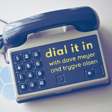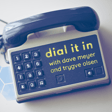
S2 Ep21 The Psychology of Decision-Making: Insights from Nikki Nicholas
In this episode of Dial It In, Dave and Trygve explore the psychology of decision-making as the first quarter comes to a close. They are joined by a seasoned life coach with expertise in unlocking the power of the subconscious mind for personal growth and transformation. With over 17 years of experience in NLP, hypnotherapy, and life coaching, she discusses the blend of Western methodologies with Eastern philosophy. Tune in to discover how top professionals navigate decision-making under pressure and learn valuable insights for business success.
Get your gift from Nikki!
…
Dial It In Podcast is where we gathered our favorite people together to share their advice on how to drive revenue, through storytelling and without the boring sales jargon. Our primary focus is marketing and sales for manufacturing and B2B service businesses, but we’ll cover topics across the entire spectrum of business. This isn’t a deep, naval-gazing show… we like to have lively chats that are fun, and full of useful insights. Brought to you by BizzyWeb.
Links:
Website: dialitinpodcast.com
BizzyWeb site: bizzyweb.com
Connect with Dave Meyer
Connect with Trygve Olsen

